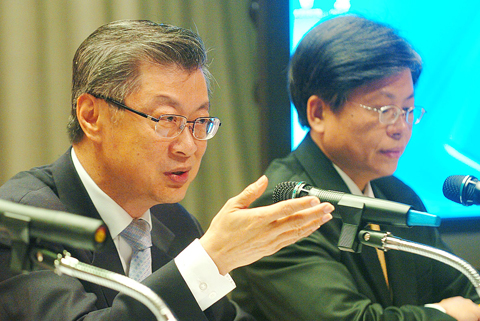The Financial Supervisory Commission yesterday called on banks to refrain from tightening loans to businesses following the implementation of a new accounting rule that could affect businesses* balance sheets.
Financial Supervisory Commission (FSC) Chairman Sean Chen (?喳) said yesterday that the commission had talked to banks about the implementation on Jan. 1 of the International Accounting Standard Statement No. 10, which includes a requirement that businesses book inventory losses on a quarterly rather than an annual basis.
Businesses had expressed concern that booking losses on a quarterly basis could reflect badly on their financial statements and affect banks* willingness to extend credit.

PHOTO: CHIEN JUNG-FONG, TAIPEI TIMES
Although the government will not penalize banks if they do tighten credit controls, Chen told a press conference after the weekly Cabinet meeting that a majority of the banks had understood the need for banks to continue supporting businesses.
Asked if the new accounting rule would also affect booking of idle equipment writeoffs, Chen said: ※It is the economic downturn 〞 not the rule 〞 that is driving down inventory prices.§
The commission said on Tuesday that the new accounting rule only requires companies to list idle equipment as operating costs, but makes no mention of when and how often they should file such costs.
The Cabinet yesterday agreed that businesses can book the writeoffs on idle equipment at the end of the year.
It also approved an amendment to the Company Act (鼠侗楊), which proposed lifting the minimum capital requirement in establishing a corporation.
Wang Pai-por (卼窫疏), the director general of the Department of Commerce, said that scrapping the capital requirement of NT$500,000 (US$15,000) to set up a limited company and NT$250,000 for an incorporated limited company could be a boost to business sentiment.
Taiwan ranked low on ease of doing business by the World Bank because of those restrictions, Wang said, adding that the revision could help the country move up the list.

SELL-OFF: Investors expect tariff-driven volatility as the local boarse reopens today, while analysts say government support and solid fundamentals would steady sentiment Local investors are bracing for a sharp market downturn today as the nation’s financial markets resume trading following a two-day closure for national holidays before the weekend, with sentiment rattled by US President Donald Trump’s sweeping tariff announcement. Trump’s unveiling of new “reciprocal tariffs” on Wednesday triggered a sell-off in global markets, with the FTSE Taiwan Index Futures — a benchmark for Taiwanese equities traded in Singapore — tumbling 9.2 percent over the past two sessions. Meanwhile, the American depositary receipts (ADRs) of Taiwan Semiconductor Manufacturing Co (TSMC, 台積電), the most heavily weighted stock on the TAIEX, plunged 13.8 percent in

A wave of stop-loss selling and panic selling hit Taiwan's stock market at its opening today, with the weighted index plunging 2,086 points — a drop of more than 9.7 percent — marking the largest intraday point and percentage loss on record. The index bottomed out at 19,212.02, while futures were locked limit-down, with more than 1,000 stocks hitting their daily drop limit. Three heavyweight stocks — Taiwan Semiconductor Manufacturing Co (TSMC, 台積電), Hon Hai Precision Industry Co (Foxconn, 鴻海精密) and MediaTek (聯發科) — hit their limit-down prices as soon as the market opened, falling to NT$848 (US$25.54), NT$138.5 and NT$1,295 respectively. TSMC's

In a small town in Paraguay, a showdown is brewing between traditional producers of yerba mate, a bitter herbal tea popular across South America, and miners of a shinier treasure: gold. A rush for the precious metal is pitting mate growers and indigenous groups against the expanding operations of small-scale miners who, until recently, were their neighbors, not nemeses. “They [the miners] have destroyed everything... The canals, springs, swamps,” said Vidal Britez, president of the Yerba Mate Producers’ Association of the town of Paso Yobai, about 210km east of capital Asuncion. “You can see the pollution from the dead fish.

TARIFFS: The global ‘panic atmosphere remains strong,’ and foreign investors have continued to sell their holdings since the start of the year, the Ministry of Finance said The government yesterday authorized the activation of its NT$500 billion (US$15.15 billion) National Stabilization Fund (NSF) to prop up the local stock market after two days of sharp falls in reaction to US President Donald Trump’s new import tariffs. The Ministry of Finance said in a statement after the market close that the steering committee of the fund had been given the go-ahead to intervene in the market to bolster Taiwanese shares in a time of crisis. The fund has been authorized to use its assets “to carry out market stabilization tasks as appropriate to maintain the stability of Taiwan’s